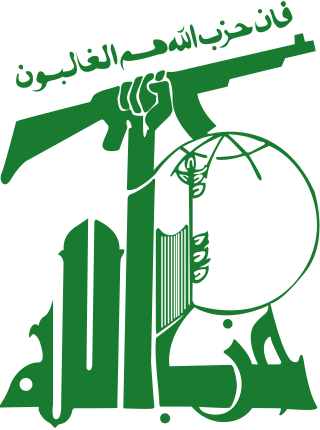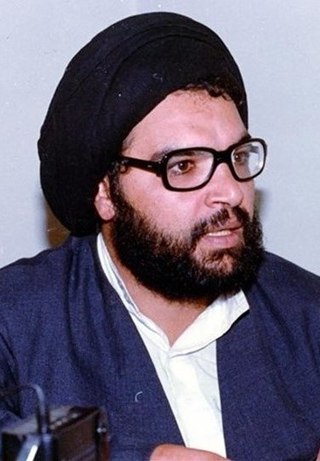
Hezbollah is a Lebanese Shia Islamist political party and paramilitary group. Hezbollah's paramilitary wing is the Jihad Council, and its political wing is the Loyalty to the Resistance Bloc party in the Lebanese Parliament. Its armed strength was assessed to be equivalent to that of a medium-sized army in 2016.

Rafic Bahaa El Deen al-Hariri was a Lebanese businessman and politician who served as prime minister of Lebanon from October 1992 until December 1998 and again from October 2000 until October 2004, before his assassination in 2005.

Saad El-Din Rafik Al-Hariri is a Lebanese businessman and politician who served as the prime minister of Lebanon from 2009 to 2011 and 2016 to 2020. The son of Rafic Hariri, he founded and has been leading the Future Movement party since 2007. He is seen as "the strongest figurehead" of the March 14 Alliance.

Abbas al-Musawi was a Lebanese Shia cleric who served as the second secretary-general of Hezbollah from 1991 until his assassination by Israel in 1992.

Dahieh is a predominantly Shia Muslim suburb in the south of Beirut, in the Baabda District of Lebanon. It has a minority of Sunni Muslims, Christians, and a Palestinian refugee camp with 20,000 inhabitants. It is a residential and commercial area with malls, stores and souks, and comprises several towns and municipalities, including Ghobeiry, Haret Hreik, Bourj el-Barajneh, Ouzai, and Hay El-Saloum. It is north of Rafic Hariri International Airport, and the M51 freeway that links Beirut to the airport passes through it.
Hezbollah originated within the Shiite block of Lebanese society. According to the CIA World Factbook estimate in 2022, Shiites comprise 31.2 percent of Lebanon's population, predominating in three areas of Lebanon: Southern Lebanon, Beirut and its environs (Dahieh), and the northern Beqaa valley region.
Muhammad Fneish is a Shia Lebanese politician and member of Hezbollah. He represented Hezbollah in the Third Cabinet of Saad Hariri, serving as the Minister of Sports and Youth.
Along with the Amal Movement, Hezbollah is one of the two main parties representing the Shia community, Lebanon's largest religious bloc. Amal has made a commitment to carrying out its activities through political means, but remains a partial fighting force aiding Hezbollah when the need arises.

The 2006–2008 Lebanese protests were a series of political protests and sit-ins in Lebanon that began on 1 December 2006, led by groups that opposed the US and Saudi-backed government of Prime Minister Fouad Siniora and ended on 21 May 2008 with the signing of the Doha Agreement. The opposition was made up of Hezbollah, Amal, and the Free Patriotic Movement (FPM); a number of smaller parties were also involved, including the Marada party, the Lebanese Communist Party and the Syrian Social Nationalist Party. A majority of the members of the government were part of the anti-Syrian March 14 Alliance, a coalition of political parties and independents in Lebanon. The two groups were also divided along religious lines, with most Sunnis and Druze supporting the government, and most Shi'a supporting the opposition. The Christian community was split between the two factions, with Michel Aoun, the leader of the FPM, claiming to have more than 70% support among the Christians, based on the results of the 2005 parliamentary election.

The March 8 Alliance is a loose coalition of political parties and independents in Lebanon formed in 2005 that are united by their pro-Syrian stance and their opposition to the former March 14 Alliance. It was the ruling coalition in Lebanon with the government headed by Prime Minister Najib Mikati from June 2011 until March 2013. Main parties of the March 8 Alliance are part of the third Cabinet of Najib Mikati since 2021.

The 2008 Lebanon conflict was a brief intrastate military conflict in May 2008 in Lebanon between opposition militias and pro-government Sunnis. After the 18-month-long political crisis spiralled out of control, with the government's decision to dismantle Hezbollah's telecommunication system, Hezbollah seized control of majority Sunni neighorhoods in west Beirut. The conflict ended with the adoption of the Doha Accord in 2008.

On 14 February 2005, former Prime Minister of Lebanon Rafic Hariri was assassinated along with 21 others in an explosion in Beirut, Lebanon. Explosives equivalent to around 1,000 kilograms of TNT were detonated as his motorcade drove near the St. George Hotel. Among the dead were several of Hariri's bodyguards and former Minister of the Economy, Bassel Fleihan.
General elections were held in Lebanon between 18 August and 15 September 1996. Independent candidates won the majority of seats, although most of them were considered members of various blocs. Voter turnout was 43.3%.

The formation of a new government led by Najib Mikati follows five months of negotiations after the fall of the Saad Hariri government. Mikati formed a controversial 30-minister cabinet. Following ruptures and tensions and two previous threats to resign, Mikati finally resigned on 23 March 2013. Tammam Salam was tasked to form a new government on 6 April 2013.

General elections were held in Lebanon on 6 May 2018. Although originally scheduled for 2013, the election was postponed three times in 2013, 2014 and 2017 for various reasons, including the security situation, the failure of the Parliament to elect a new President, and the technical requirements of holding an election. A new electoral law adopted in 2017 provides a proportional representation system for the first time.
Mohammad Safadi is a Lebanese businessman who served as minister of finance under Najib Mikati between 2011 and 2014. He was also the minister of economy and trade from 2008 to 2011.

Ali Al Shami is a Shia Lebanese academic and a member of the Amal movement. He was Lebanon's minister of foreign affairs and emigrants from 2009 to 2011.
Wissam Adnan al-Hassan was a brigadier general at the Lebanese Internal Security Forces (ISF) and the head of its intelligence-oriented Information Branch. Seen as a leading Sunni figure in Lebanon, he was also a key player in the opposition March 14 alliance without having a political position.
On 19 October 2012, Wissam al-Hassan, a brigadier general of the Lebanese Internal Security Forces (ISF) and the head of its intelligence-oriented information branch, died along with several others killed by a car bomb in the Achrafieh district of Beirut. The killing of a senior figure closely linked with the anti-Assad camp in Lebanon led to immediate speculation that Syria, or its allies, were behind the attack in Beirut. Al-Hassan had also led the investigation that implicated Syria and its ally Hezbollah in the killing of the former prime minister Rafik Hariri.

General elections were held in Lebanon on 15 May 2022 to elect all 128 members of the Lebanese Parliament. The country has for several years been the subject of chronic political instability as well as a serious economic crisis aggravated by the 2020 explosions that hit the Port of Beirut and faced large-scale demonstrations against the political class.













